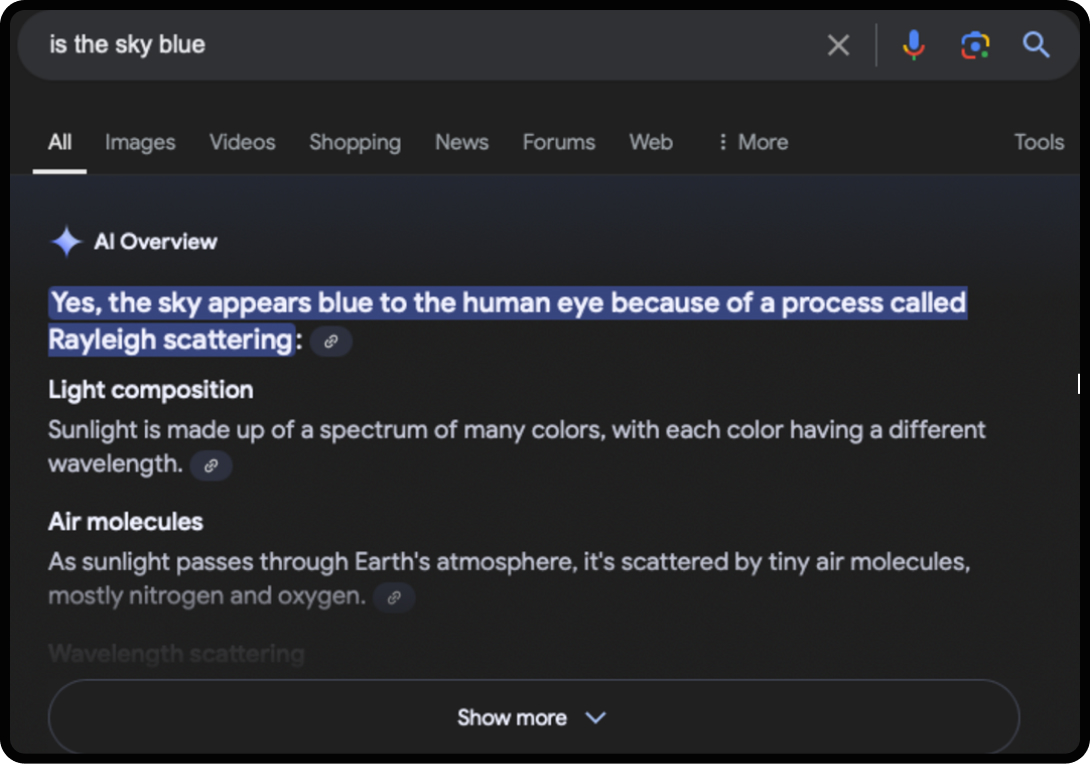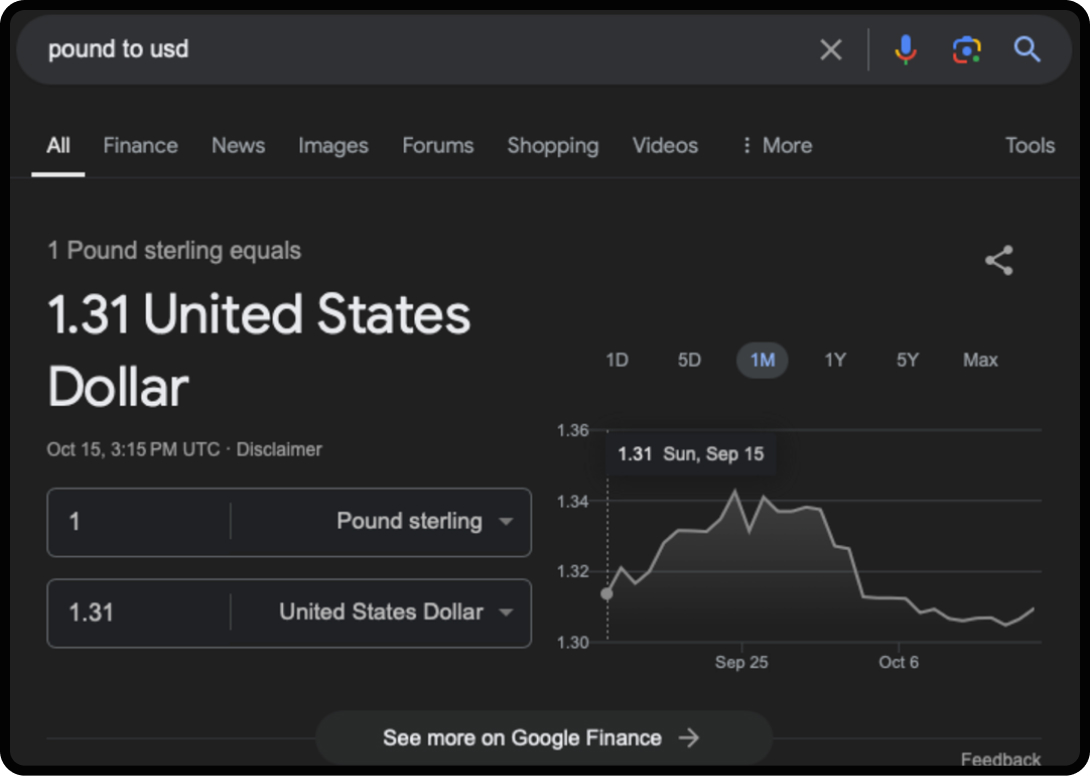Update: October 2024
Zero click searches in 2024 have transformed the practice of search engine optimization (SEO). Users no longer have to visit a website to receive answers to their questions from Google and AI. The new generation of AI is changing conventional user behavior and making waves in website visibility and traffic.
Large Language Models (LLMs) like Chat GPT, Gemini, Perplexity AI, and others are becoming increasingly common. With the ability to comprehend and produce human-like writing, advanced language models can change how search engines interpret and present results. Because of this change, SEOs and marketers need to shift how they think and target zero click searches.
Not sure where to start your strategy to tackle zero-click search?
Marketers and brands need to implement a zero-click marketing strategy to improve their visibility. The key term in this new phase of marketing is visibility. SEOs and anyone trying to gain more traffic are increasingly focusing on structured data and Schema markup to improve the chances of their content being featured in rich results and enhanced snippets.
Any new search feature is going to influence the SEO landscape, and with the rise of LLMs and the push for structured data, it is essential for SEO professionals to adapt their strategies to meet these evolving search trends.
What Are Zero Click Searches?
Zero click searches are search queries that do not result in a user clicking through to any search results. Searchers don’t have to click through to a website to find the information they need. Instead, they find it directly on the search engine results page (SERP). Most users encounter these types of results when they have questions or queries that can be answered with a simple piece of information, such as the current time, weather forecast, or basic definitions.
Direct response engines are staying innovative through an increasing usage of smart gadgets and household devices with voice search capabilities. Instead of having to go through several search results or clicking on different sites, users just voice a question and get a direct solution in a single response.
Zero click searches are becoming increasingly common as search engines aim to provide quick and direct answers to user queries. There are six types of zero-click results: knowledge panel, AI overview, direct answer, featured snippet, people also ask and Google map.
1. Knowledge Panel
These panels generate direct answers by pulling information from various reputable sources and presenting them in a concise and user-friendly format. Knowledge panels are common for searches involving business names. Typically the result is shown on the right side of the screen in a panel format.

Knowledge panels, like “People Also Ask” and “Featured Snippets,” are revolutionizing the way users find direct answers to their queries.
2. Featured Snippet
A featured snippet is a summary “clip” from a website. The website’s title, name, and link is included in the snippet. It’s typically one source and is intended to give the user a quick answer to a simple question. The answer is highlighted in the SERP, and the user doesn’t have to click unless they want more information beyond their search. This can be a useful tool for SEO since it can encourage users to click on the specific highlighted website as opposed to the other listed websites that do not have a snippet.

3. People Also Ask (PAA)
This type of zero-click search is triggered by a user’s initial search and relates to questions similar to what other users have asked. This allows for further related searches for a broader scope than the original search result.

4. AI Overview
Answer Engines and Search Engines providing direct answers is revolutionizing the way people search for and receive information. AI Overview provides a more in-depth response to users questions than featured snippets. The answer uses Google’s Large Language Model, Gemini, to answer user questions based on its sources instead of providing a snippet of an article. These systems will continue to grow and become better at generating direct answers to users’ queries, providing a concise and relevant response to their questions.

5. Direct Answer
Answers that require zero work from a user – no reading paragraphs from websites, only receiving a simple response – would be a direct answer. Zero-click is often used for things like exchange rates. These numbers are constantly changing and Google’s choice to include them directly in the SERP gives users a quick and simple answer without having to leave the page.

6. Google Map
If conducting a location-based search, the results may show up on a Google Map. From here users only have to search directly on the map for an answer. Generally users don’t click on results and can find the answer they need through multiple options Google gives in the search. For example, say you are looking for a restaurant in a particular area. It’s likely that instead of clicking through websites you will just click directly on the Google map to find what you want.

Extra Tip: Schema & Structured Data
Schema and structured data are the best ways for websites to structure their content for direct answers, making it easier for search engines and answer engines to understand and display information in a more user-friendly format. Structured data makes your pages eligible for rich snippets, knowledge graphs, and direct answers.

Schema markup also helps answer engines and AI better understand the intent behind user queries, enabling them to deliver more personalized and contextually relevant information.
How Do Zero Click Searches Impact Your SEO Strategy?
Zero-click experiences can significantly impact SEO and overall website strategy. The rise of zero click results means that marketers relying on organic search traffic need to adapt their approach to be visible and competitive.
Some benefits of zero-click experiences include increased visibility and potential for higher traffic. Targeting featured snippets and other rich results with structured data can improve traffic and brand recognition metrics.
Some SEOs see the downsides as reduced click-through rates and potential loss of control over user interaction with the content. Understanding the impact of zero click experiences on SEO strategy and taking actionable steps to adapt can help marketers stay competitive in the evolving search landscape.
How Zero Click Searches are Changing
Zero click searches have been fluctuating over the years. In 2024, 58.5% of searches conducted on Google, both desktop and mobile platforms, concluded without users clicking through to another website.

Desktop searches have a higher percentage of zero-click searches compared to mobile searches. In 2022, Semrush found that 25% of desktop searches were zero-click and while only 17.3% of mobile were. This is a change from 2020 where mobile devices had a higher percentage of zero-click searches.
Disadvantages Of Zero Click Searches
Aiming for zero click search results has a few drawbacks. One significant disadvantage is that it can result in less organic traffic. Users may no longer feel the need to click through to a website if additional information is presented immediately on the SERP, which would mean a loss of prospective visits, engagement, and conversions. It’s essential to optimized your content so it’s presented in a zero-click format, yet draws users into your website to find out more information.
Zero-click searches may also lead to a decrease in brand visibility and recognition. If a user gets the information directly from the SERP, they may not be as exposed to your brand, which will hurt your brand’s overall ability to reach new people from organic search.
How to Spot and Avoid Zero-Click Searches
When encountering potential zero click results, there are a few high-level tips to keep in mind. Be vigilant and pay attention to the search results page. Look out for featured snippets, knowledge panels, and direct answers, as these are common indicators of zero-click results. Secondly, consider refining your search query to be more specific and targeted in order to avoid triggering zero-click results. If you decide to follow a strategy of avoiding zero-click results, there are a few ways you can format your content to combat this type of search engine result.
7 Strategies to Avoid Zero Click Results
1. Long-tail Keywords
When combating zero click results, it’s important to implement a long-tail keyword strategy. Long-tail keywords are more specific and targeted phrases that are longer and more detailed than generic keywords. For example, instead of using “shoes” as a keyword, a long-tail keyword could be “red running shoes for women.” Long-tail keywords are less competitive, making it easier for websites to rank higher in search engine results and attract more organic traffic.
2. Content Format
Create content in formats that are less likely to be fully displayed in the SERP, such as videos, interactive elements, or long-form articles. These elements are likely more informational and educate your users about larger topics instead of providing an answer-like format. Write content using easy-to-understand natural language. Don’t write solely to optimize your content; write content that actually solves a user’s problem or question.
3. Structured Data Markup
If you must, avoid using structured data markup – this will limit your eligibility for rich results placements. Google is continuously pushing this for webmasters, and many CMS systems have automatic placement deployed to assist in organic visibility.
4. Focus on User Intent
Create content that satisfies user intent but leaves room for users to seek more detailed information on your website. This could put extra emphasis on internal linking and ensuring that you provide a clear path forward for any users who land on your site.
5. Optimize Meta Descriptions
Write compelling meta descriptions that encourage users to click through to your website for more information. While meta descriptions aren’t an SEO ranking factor, this element can separate you from other results if you focus on a deep-level of understanding of the topic.
6. Improve Click-Through Rate (CTR)
Focus on improving your website’s CTR by optimizing titles, meta descriptions, and other elements that appear in search results. Ensure that your site is compliant with Core Web Vitals as this is likely your fastest lever to generate additional conversions.
7. Monitor Performance
Regularly monitor your website’s performance in search results to identify and adjust strategies that may be leading to zero click searches.
Advantages of Zero Click Searches
Since users want information to be easily accessible, and zero-click searches are increasing, it’s essential to consider how to use zero-click to your advantage and optimize for changes in search. Zero click searches, such as appearing in featured snippets, knowledge cards, or other rich results, can provide several benefits to businesses and websites. They can significantly increase visibility and attract more organic traffic, enhancing user experience by providing quick and direct answers to queries and establishing the website as an authority in its niche.
For those with specific strategies, featuring in zero click searches opens up opportunities to capture organic traffic searching for quick answers or information, leading to higher conversion rates and engagement. It also positions a business as a trusted source of information, improving brand reputation and credibility.
How To Target Zero Click Searches
Zero-click experiences may have drawbacks, as we’ve seen, including a drop in website traffic and fewer chances for user engagement and interaction. However, if marketers know how to optimize for answer engine and question-answer results, they may still benefit from zero-click searches.
Marketers can improve their chances of appearing in zero-click search results by concentrating on producing clear, succinct content that directly addresses frequently asked user questions. This can increase overall exposure and brand familiarity and position their brand as a reliable information source.
6 Strategies for Optimizing For Zero Click Searches
1. Understanding Featured Snippets
Featured snippets are the most common form of zero click results. By optimizing your content to appear in featured snippets, you can increase your chances of capturing zero click traffic. Identify common questions or search queries related to your industry and create content that directly answers these queries.
2. Keyword Optimization
Identify high-volume keywords that are likely to generate zero click results. Focus on creating content and optimizing for these keywords to increase the chances of appearing in zero click searches.
3. Structured Data Markup
To give search engines a clear and organized description of your material, use structured data markup on your website. This can aid search engines in comprehending and presenting your material as a result that requires no clicks.
4. Local SEO for Zero Click Searches
For marketers targeting local customers, optimize your Google My Business listing to appear in local search zero click results. Ensure that your business information is accurate and up to date.
5. User Intent Optimization
Understanding user intent is crucial for optimizing for zero click searches. Create content that directly addresses the intent behind the search query, increasing the likelihood of appearing as a zero click result. Focusing on user intent will increase your chance of showing up in People Also Ask Panels. These tend to drive more clicks and user interaction since by looking at these search queries the user is indicating their interest.
6. Mobile Optimization
With the rise of voice search, optimizing for zero click results on mobile devices is crucial. Ensure that your website is mobile-friendly and provides concise, clear answers to common search queries to appear in zero click results.
SEO and Zero Click Search Strategy
Since both SEO and zero click searches deal with a website’s exposure and positioning on search engine results pages (SERPs), they are closely connected. When a user’s query is resolved without requiring them to click through to a specific website, this is known as a zero-click search.
Optimizing a website’s content and architecture is the aim of SEO in order to raise its search engine ranking and draw in organic visitors. But as zero-click searches become more popular, the conventional method of SEO is changing.




